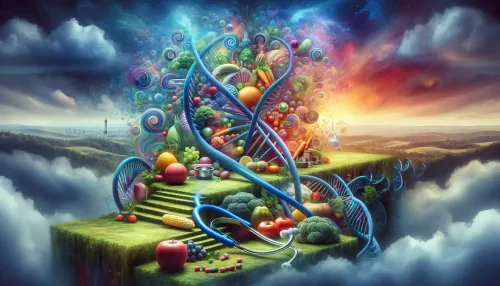Gut Instincts: Leveraging the Gut Microbiome for Optimal Health

Welcome to the Peppino Blog, where we dive deep into the intricate world of health and wellness. Have you ever had a "gut feeling" about something? It turns out that there's a scientific basis for that. In our quest for optimal health, the gut microbiome plays a pivotal role, influencing various aspects of our well-being. Referred to as the "second brain," our gastrointestinal system is home to trillions of microbes that affect everything from nutrient absorption to immune function.
The Gut-Health Connection: Understanding the Second Brain
Recent studies underscore the complexity of the gut-brain axis a bidirectional communication network linking the enteric nervous system of the gut with our central nervous system. Changes in gut microbiota can have substantial impacts on our overall health. For instance, disruptions in this balance may contribute to conditions like obesity, diabetes, and even neurodegenerative diseases.
Fermentation isn't just a method for preserving food; it's at the forefront of nutritional science, especially regarding probiotics' role in enhancing gut health. Probiotics are live bacteria and yeasts that complement the natural microbiome within our digestive tract, helping restore a healthy balance. This burgeoning field promises a fermented future where nutrition is personalized and proactive.
Probiotics and Their Role in Nutrition Science
As with much of modern medicine, personalizing treatments including probiotic supplementation is becoming more prevalent. However, no one-size-fits-all solution exists when it comes to optimizing gut health. Personalized probiotics involve analyzing an individual's gut flora and tailoring interventions accordingly.
Switching gears from digestion to mood, an exciting area within gut microbiome research involves its connection to mental well-being. Few could have predicted that our digestive bacteria would play a role in psychological health, but studies consistently link gut flora imbalances with mental health issues like anxiety and depression.
Related Article: Sleep Science Breakthroughs: Enhancing Rest and Recovery Methods
Personalized Probiotics: Tailoring Gut Health Solutions
The "gut-brain axis" is now recognized as a key player in this association; neurotransmitters produced in the gut signal to the brain and influence feelings of happiness or stress.
The Gut-Brain Axis: Linking Digestive Bacteria to Mental Health
Thanks to advanced sequencing technologies, scientists now have the tools necessary for comprehensive microbiome mapping. This technique offers groundbreaking insights into what your gut says about your overall health. A diverse microbiome is typically considered a sign of good health; conversely, low diversity has been linked with various diseases.
Navigating the landscape of gut health often leads to discussions about prebiotics versus probiotics. Both are integral for maintaining a balanced microbial ecosystem within us but serve different functions. Prebiotics are fibers that feed beneficial bacteria in your gut. They're found in foods like bananas, onions, garlic, and asparagus. Probiotics, meanwhile, are those beneficial bacteria themselves.
The synergy between these two is crucial: prebiotics help nourish and sustain probiotics maintaining intestinal harmony.
Microbiome Mapping: Insights into Your Health from Your Gut
So what does all this mean for your daily diet? Understanding microbiome findings can transform how you approach eating for optimal health. The paradigm shift is towards diets that support microbial diversity and functionality think plant-based meals rich in fiber and fermented foods that offer an abundance of natural probiotics.
Prebiotics vs. Probiotics: Balancing Your Microbial Ecosystem
Peppino Blog believes that taking these research insights from laboratory benches to kitchen counters doesn't have to be daunting. Simple swaps like replacing some animal proteins with leguminous plant proteins or adding a daily serving of fermented food can have profound positive effects on your gut microbiome.
Frequently Asked Questions
The gut-brain axis is a bidirectional communication network between the gut's enteric nervous system and the central nervous system. It plays a crucial role in overall health, influencing nutrient absorption, immune function, and even mental well-being. Disruptions in this connection can lead to various health issues, including obesity and anxiety.
Probiotics are live bacteria and yeasts that enhance the natural microbiome within our digestive system. They help restore balance by complementing beneficial bacteria, which can improve digestion, boost immunity, and potentially alleviate conditions like irritable bowel syndrome. Incorporating probiotics into your diet can promote overall gut health.
Prebiotics are non-digestible fibers that feed beneficial gut bacteria, while probiotics are live microorganisms that provide health benefits. Prebiotics are found in foods like bananas and garlic, helping to nourish probiotics. Together, they maintain a balanced microbial ecosystem essential for optimal digestive health.
Check Out These Related Articles

The Science of Sleep: Optimizing Your Rest for Health and Vitality

Revolutionizing Recovery: The Next Generation of Post-Injury Rehabilitation

Epigenetics and Lifestyle Medicine: Redefining Our Genetic Destiny
